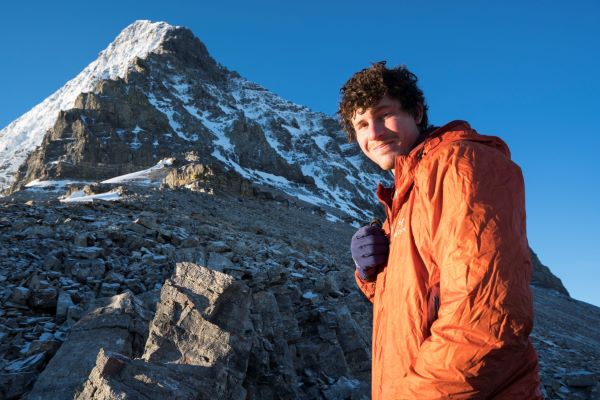
Alchemy, as defined by ancient civilizations, revolved around the practice of transforming conventional Earth-made materials into objects of wealth. Alpinism, the practice of tracking up tall mountain summits, might not adhere to a pseudo-scientific root but remains similarly philosophical: an activity where the journey upwards provides true freedom through one’s mastery of nature. This adventurous spirit was what drove Marc-André Leclerc, the focus of The Alpinist and one of the most acclaimed climbers few knew about it. That’s how Leclerc preferred it. He had no interest in the publicity and Instagram followings that define modern-day mountaineering. Instead, he sought each challenge out because it offered something new for him to accomplish.
The reason for the past tense in the above description is tragic, but it’s not the documentary’s focus. According to co-director Mortimer, he had been in the process of wrapping up the two-year documentation of the sportsman’s life in 2018 when Leclerc and climbing colleague Ryan Johnson failed to return from a mountain climb in Juno, Alaska, with a subsequent storm preventing any chance of rescue or investigation.
Everything before that is a celebration of Leclerc: charismatic, quiet, and downright good-natured. Each interviewee has nothing but positive things to say about the astonishing feats he casually pulled off by age 23. This includes Alex Honnold, acclaimed free climber and subject of the 2018 documentary Free Solo, who discovered Leclerc after learning that he beat Honnold’s climbing record for scaling British Columbia’s Grand Wall by two minutes. The kicker: Leclerc didn’t even realize he beat a record at the time. He never approached it as a challenge.
Leclerc’s spiritual outlook toward free solo climbing is, in many respects, an extension of who he had always been. Diagnosed with ADHD as a child, he took an interest in historical adventure books and, after finishing high school, decided that rock climbing would be his career. The filmmakers find Leclerc in the Canadian municipality of Squamish, climbing excruciatingly high mountains with little fanfare, no money, and not even a cell phone (a fox stole his food bag with the phone inside) to record them.
He was even chill about using a stairwell as a bed for years, later upgrading it to a tent after meeting his girlfriend, Brette Harrington, who soon became Leclerc’s travel companion on countless climbs. With curled locks and a mild demeanor, everything about Leclerc makes him out to be quite ordinary, but, as Squamish’s self-proclaimed rock-climbing “mayor” Allen “Hevy Duty” Stevenson points out, he’s got the boldness of a man from another era.
It’s that inconspicuousness that makes scenes of Leclerc in his element so awe-inspiring and queasy. Approaching death-defying climbs with the casualness of crossing the street, the camera regularly lingers on his body hanging onto mountainsides, excavating cliffs for nooks and crevices before pulling back to reveal the scale of the mountain itself. They are massive, pillars of rock and ice intruded upon by a speck in a winter coat and a pickaxe performing a spectacle straight out of a video game.
Fans of Leclerc’s free-solo trips dub him a practitioner of the “evolution of alpinism,” venturing beyond what normal climbers would attempt and even scampering up headwalls using newly formed ice stalactites as handholds. That they express concern for how casually he risks life and limb with each new trip is only heartbreaking in hindsight.
Being naturally aloof makes Leclerc something of an enigma, with Mortimer even losing contact with him for a few months and occasionally rediscovering him through cameos on other people’s social media pages. But the film frames this as part of how he approached the solo climbing lifestyle unlike any other. Solos aren’t really solo to Marc if there’s a camera crew involved. He only lets the filmmakers accompany a climb if he’s already made the journey before and limits what they can shoot vs. what he films. However, the journey exposes Leclerc’s humanity, his ability to connect with friends and village locals while moving from place to place.
The Alpinist really is a story of actions speaking louder than words. Much of Marc-André Leclerc’s life was spent on the climb, but it’s what he achieved and how far he was willing to go that made him feel larger than life at only 23. Perhaps he was happiest when it was just him and the mountaintop in solitude. In letting himself be caught on camera, The Alpinist reveals just how much that quiet individual meant to those whose paths he crossed.
















Leave A Comment